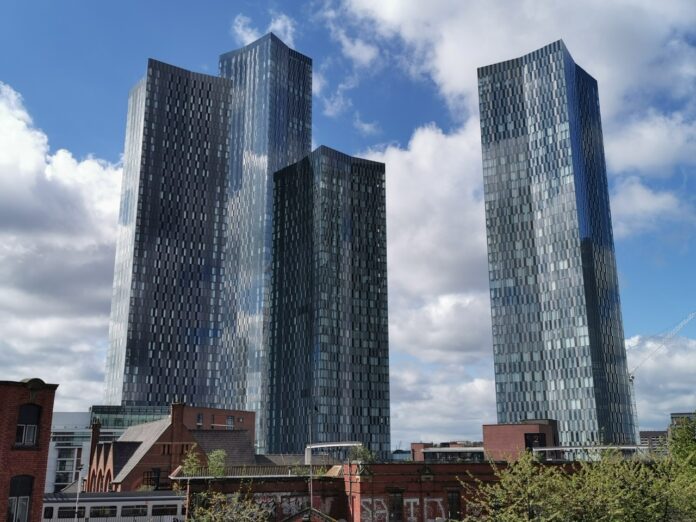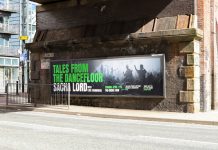Manchester has seen its population grow by 31 per cent in the last twenty years, qualifications amongst its residents has risen and it is recovering from the Covid lockdown according to the latest State of the City report out today.
However says the report, there has been a significant increase in the number of people claiming unemployment benefits,the pandemic has deepened existing inequalities in the city, and the number of households experiencing homelessness in Manchester has remained high.
The latest ONS mid-year population estimates suggest that Manchester has had a 31% growth in population between 2001 and 2020 and it is evident that Manchester’s popularity is rising and is an attractive place to study, work and live.
The resilience of Manchester’s economy has been tested throughout the economic closures and changing travel guidelines following COVID-19. During the pandemic 95,400 jobs were supported though the government’s furlough scheme. There are now signs of Manchester’s economy recovering. Job vacancies continue to fluctuate in the city but remain on an upwards trajectory – the highest being 7,900 jobs advertised during the week ending 18 September.
Vibrant development has continued to transform the city’s skyline. Significant city centre development schemes include NOMA, St Mary’s Parsonage, St John’s and Great Jackson Street. There are many other schemes under development or in the pipeline, including a major redevelopment of North Manchester General Hospital to create the new North Manchester Health Campus.
There has been a continued increase in residents with higher-level qualifications. As of 2020, 47.7% of residents have higher-level qualifications, which is above the national average. However, recent improvements to skills, qualifications and wages have not reached all our communities.
Older residents, those for whom English is not their first language, disabled residents, and residents with a long-term illness are more likely to have low skill levels and therefore be more vulnerable to job losses, the report found.
With the City committed to a green, zero-carbon economy, its new employability programmes will aim to prioritise green economy skills to broaden the skills base and support advancements in the digital economy.
Work is underway on the development of a zero-carbon skills framework to understand the skill needs that will emerge for each sector, including retrofitting buildings, low-carbon heating and low-carbon transport and low-carbon services.
Due to the high levels of unemployment during the pandemic, there has been a significant increase in the number of people claiming unemployment benefits. Rapid intervention is required to get residents back on track- locally, the Manchester’s Rising Star Fund was launched in January 2021 to support ambitious young people to overcome barriers that are preventing them from progressing in education, employment or training.
The pandemic has had a major impact on the delivery of education, with schools closed for most pupils for significant periods. To aid those most vulnerable, education providers have delivered good-quality remote learning and the council provided support to schools and allocated over 3,000 laptops to disadvantaged children. Manchester is dedicated to improving outcomes for all children. The Education Services within the Council will continue to work closely with Early Years providers, schools, post-16 providers and education leaders to develop a long-term plan to address the impact of the pandemic on children and young people.
The pandemic has deepened existing inequalities in the city, particularly for our more deprived communities, ethnic minorities, women, migrants, those living in poverty, and older people, meaning our focus on reducing inequalities is more important than ever.
The number of households experiencing homelessness in Manchester has remained high during the past year. At the end of March 2021, 2,546 households were residing in temporary accommodation, in part due to lack of move-on options during lockdown.
The ‘Everyone In’ initiative led to greater engagement with statutory and support services. In 2020/21, the Housing Solutions Service successfully prevented 789 individuals and families from becoming homeless through a variety of interventions. A range of responses have been developed to tackle rough sleeping in the city, including the A Bed Every Night initiative.
During the pandemic there was a substantial rise in demand for foodbanks and pantries, and an increase in free-school meals eligibility. To give families practical support, the Our Manchester Pocket Guide was developed, and the Family Poverty Strategy was reprioritised to meet the needs of children and families living in poverty.
Increasing the delivery of housing – and affordable housing in particular – will be a key part of the city’s recovery following the pandemic. Demand for housing from the most vulnerable residents has increased with growing numbers on the housing register and in temporary housing. During 2020/21, construction began on 2,000 new homes across the city, of which 844 are affordable.
Transitioning to a zero-carbon city remains a key priority for the city. Manchester City Council is on track to becoming zero-carbon by 2038- emissions fell by 21% in 2020/21. However, the city is not yet decarbonising at the required pace and emissions must now reduce by at least 16% each year until 2038. Over the past year, a range of projects have been delivered to progress our zero-carbon ambitions, including completion of the first walking and cycling route supported by the Greater Manchester Mayor’s Challenge Fund – creating a safer environment for cyclists and pedestrians. In tandem with this, 2km of district heat transmission network was installed for the Civic Quarter Heat Network (pipes, power cables and communication cables) along with the completion of the Tower of Light.
Libraries and parks proved to be essential to Manchester’s communities over the pandemic. Libraries offered online programmes and events during lockdown and there was an 89% increase in electronic resource use. Libraries also set up two initiatives to support digitally excluded residents to become confident online users in their own homes. There was also a large increase in park visits, and over 11,600 young people engaged in park activities throughout the summer.
For a city to be successful it needs to be well connected locally, nationally and internationally. Travel demand to and from the city centre is usually high, however due to the pandemic there was a decrease in journeys across all modes between 2019 and 2020.
The Council continues to work collaboratively with Transport for Greater Manchester to take a strategic approach to planning the city’s transport network. During 2020/21, £18.8million was invested into improving roads and footways. Projects such as the Great Ancoats Street project, the Medlock Street roundabout congestion reduction scheme and the first phase of Chorlton walking and cycling scheme were also completed. The refreshed City Centre Transport Strategy prioritises walking as the main way of moving around the city centre.
Ensuring that residents are equipped with the skills and technology to make the most of our rapidly digitising world is integral to Manchester’s future. Many residents now rely on reliable broadband connections and digital skills. In 2020, Manchester developed a Digital Inclusion Action Plan working with stakeholders across the city to reduce digital exclusion.
Councillor Bev Craig, Leader of Manchester City Council, said:
“State of the City shows that Manchester has continued to achieve many successes during an incredibly difficult year for the city, and the legacy of the pandemic will be with us for some time. Our economy has been resilient to the impacts of the pandemic, our population continues to grow quickly. We have supported our children to learn, our residents to stay healthy and well, we are working harder than ever to tackle poverty and inequality, and significant investments are being made across the city for the next ten years.
“Manchester’s future remains optimistic; we all want to build an even better city. Four points stand out for me where we need to work with all partners to go further. First, to do even more to build a more inclusive economy for all residents of Manchester that allows everyone to benefit from our growth. Second, we know that COVID has exacerbated inequalities, so we must redouble our efforts to tackle inequality and invest in communities. It is essential that we work with the most vulnerable and disadvantaged communities. Third, to be even more ambitious on affordable housing. Fourth, to quickly reduce our carbon emissions as a city.
“Finally, on behalf of Manchester City Council, I would like to thank the people of Manchester for their resilience and efforts to make Manchester a world class city.







